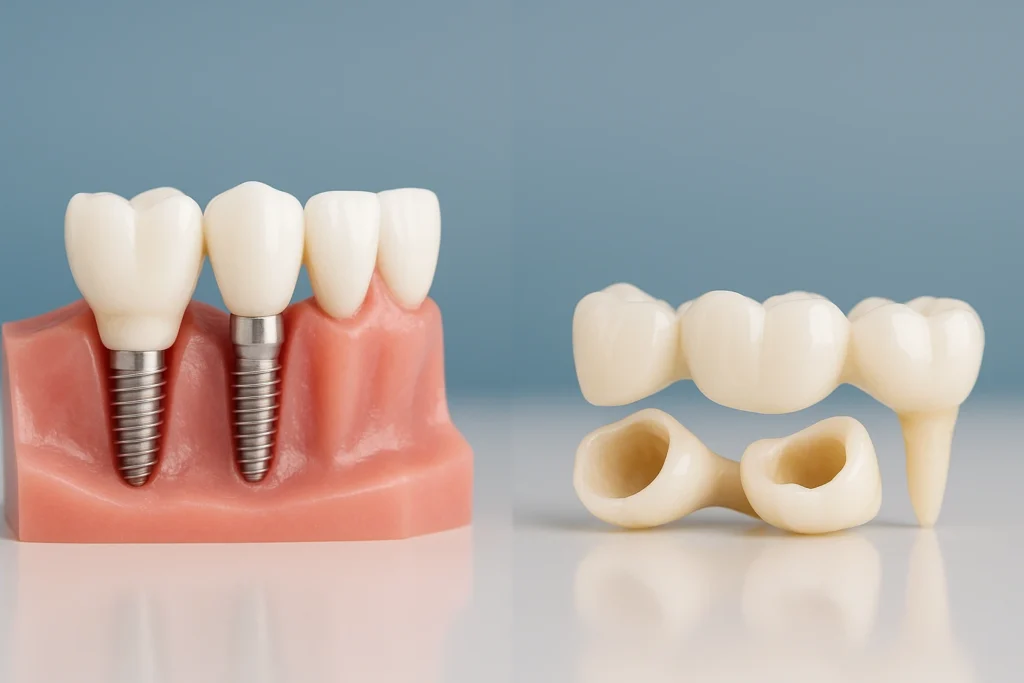In this article, we’ll explore the differences, costs, pros and cons, and maintenance requirements of dental implants and bridges to help you make an informed decision. We will also discuss the scenarios where one option might be preferred over the other and provide guidance on how to maintain these dental solutions effectively. This comprehensive insight aims to ensure that whether you opt for a dental implant or a bridge, your decision aligns with your oral health goals and lifestyle preferences.
Dental Implants
Dental implants are artificial tooth roots, typically made from titanium, that are surgically placed into the jawbone. They serve as a sturdy foundation for attaching a replacement tooth or crown. The titanium material is biocompatible, which means it integrates well with the bone, creating a stable and durable support for the artificial tooth. Implants are known for their durability and natural appearance, closely mimicking the function and look of natural teeth. This makes them an attractive option for those seeking a long-term solution to tooth loss.
The process of getting dental implants involves several steps, including an initial consultation, the surgical placement of the implant, a healing period to allow for osseointegration, and finally, the attachment of the crown. While this process can take several months, the result is a permanent solution that not only restores the aesthetics of your smile but also enhances your ability to chew and speak comfortably. Additionally, dental implants do not require altering adjacent teeth, preserving the integrity of your natural teeth.
Pros of Dental Implants
- Longevity: Dental implants are designed to last for many years, often for a lifetime with proper care. This long-term durability can make them a cost-effective solution over time, as they may not need replacement.
- Natural Appearance: Implants look and feel like natural teeth, offering a seamless blend with your existing teeth. The crowns are custom-made to match the color and contour of your natural teeth, enhancing your smile’s aesthetic.
- Bone Health: Implants stimulate the jawbone, preventing bone loss that typically occurs with missing teeth. This helps maintain the structure of your face and jaw, preventing the sunken look that can occur with tooth loss.
Cons of Dental Implants
- Cost: The initial cost of dental implants is generally higher than dental bridges. This can be a significant factor for many patients, although financing options may be available through dental clinics.
- Surgical Procedure: Implant placement requires surgery, which involves a longer recovery time. Patients must be prepared for the commitment and time needed for healing and follow-up appointments.
- Eligibility: Not everyone is a candidate for dental implants. Adequate bone density and good oral health are necessary for successful implantation. Conditions such as uncontrolled diabetes or habits like smoking can affect the success rate of implants.
What Are Dental Bridges?
Dental bridges are fixed dental prosthetics that fill the gap created by one or more missing teeth. They consist of crowns placed on the teeth adjacent to the gap and a false tooth (or teeth) in between. Bridges can be made from various materials, including porcelain and metal, allowing for a choice that best suits the patient’s needs and budget. They are an effective way to restore not only the function of the missing teeth but also the appearance of your smile.
The procedure for getting a dental bridge involves preparing the adjacent teeth, taking an impression of your teeth, and fitting the bridge. This process is generally quicker than getting an implant and does not involve surgery, making it a less invasive option. However, the reliance on adjacent teeth means that they must be healthy and strong enough to support the bridge, which can sometimes require additional dental work.
Pros of Dental Bridges
- Quicker Process: Bridges usually require less time to complete than implants, often needing only a few dental visits. This can be advantageous for those seeking a faster solution to tooth loss.
- No Surgery Required: Unlike implants, bridges do not require surgical procedures. This reduces the risk of surgical complications and may be a preferable option for those with medical conditions that make surgery risky.
- Cost-Effective: Generally, bridges are less expensive upfront compared to implants. This makes them accessible to a wider range of patients, although long-term costs should be considered.
Cons of Dental Bridges
- Longevity: Bridges typically last 5 to 15 years, which is less than the potential lifespan of implants. Regular maintenance and potential replacements can add to the cost over time.
- Tooth Damage: Placing a bridge requires modifying adjacent teeth, which can weaken them over time. This alteration can also increase the risk of decay and gum disease in the altered teeth.
- Bone Loss: Bridges do not prevent bone loss in the jaw, as they do not engage with the bone beneath. This can lead to changes in facial structure and the need for additional dental work in the future.
Cost Comparison: Implants vs. Bridges
When considering dental implants vs dental bridges, cost is a significant factor for most people. It’s important to weigh the initial costs against the long-term benefits and potential future expenses.
- Implants: The cost of a single dental implant can range from $3,000 to $5,000 or more, depending on the complexity of the procedure and your location. While this cost is higher, the durability and longevity of implants can offset the initial expense over time.
- Bridges: A dental bridge can cost between $2,000 and $5,000, depending on the materials used and the number of teeth involved. While cheaper upfront, bridges may require more frequent replacements, increasing long-term costs.
While implants have a higher initial cost, their durability can make them more cost-effective over time. Bridges may be less expensive initially but may require replacement sooner, adding to long-term costs. Evaluating these costs in relation to your budget and dental insurance coverage is crucial in making an informed decision.

When to Choose a Bridge Over an Implant
Choosing between a bridge and an implant can depend on several factors, including your oral health, financial situation, and personal preferences.
- Bone Health: If you lack sufficient bone density and are not a candidate for bone grafting, a bridge might be the better option. Bridges do not require the same level of bone support as implants, making them suitable for more patients.
- Time Consideration: If you need a quicker solution, a bridge can be completed in a few weeks, whereas implants can take months. This can be important for those seeking immediate results or those with time constraints.
- Cost Constraints: If upfront costs are a concern, bridges offer a less expensive initial option. However, consider the potential need for future replacements and associated costs.
Maintenance for Dental Implants and Bridges
Proper maintenance is crucial for the longevity and effectiveness of both dental implants and bridges. Regular care not only ensures the functionality and aesthetics of your dental solution but also supports overall oral health.
Dental Implants
- Hygiene: Regular brushing and flossing are crucial to prevent gum disease around the implant. Use of a soft-bristled toothbrush and non-abrasive toothpaste is recommended.
- Dental Check-Ups: Routine visits to the dentist are essential for monitoring implant health. These visits help ensure the implant is functioning properly and address any issues early.
- Avoid Hard Foods: To protect the implant, avoid biting down on hard objects that could damage the crown. Similarly, avoiding habits like chewing ice can prevent unnecessary stress on the implant.
Dental Bridges
- Flossing: Special floss or interdental brushes are necessary to clean under and around the bridge. Effective cleaning helps prevent plaque buildup and gum disease.
- Routine Dental Visits: Regular check-ups ensure the bridge remains in good condition. These visits allow your dentist to assess the bridge’s fit and function and address any arising issues.
- Avoid Sticky Foods: Hard or sticky foods can dislodge or damage a dental bridge. Being mindful of your diet can help maintain the bridge’s integrity and longevity.
Implant Longevity and Durability
Dental implants are often praised for their longevity. With proper care, they can last a lifetime. This durability makes them a popular choice for those seeking a permanent solution to tooth loss. According to the American Dental Association, dental implants provide stability and preserve bone health, making them a reliable long-term option.
- Oral Hygiene: Maintaining excellent oral hygiene helps prevent infections that could compromise the implant. Regular cleaning and professional check-ups are essential components of implant care.
- Regular Check-Ups: Professional cleanings and check-ups help catch any potential issues early. Early detection of problems can prevent more serious complications and extend the life of your implant.
- Overall Health: Good overall health, including not smoking and managing chronic conditions like diabetes, can enhance implant success. A healthy lifestyle supports the healing process and contributes to the long-term success of the implant.
Conclusion
Both dental implants and bridges offer viable solutions for replacing missing teeth. When deciding between the two, consider factors like cost, longevity, oral health, and personal preferences. Consulting with a dental professional can provide personalized advice based on your individual situation. They can assess your oral health and recommend the best option to meet your needs.
If you’re considering dental implants, explore our restorative dentistry options to understand which treatment fits your smile goals.
Ultimately, whether you choose implants or bridges, restoring your smile can significantly improve your quality of life. A complete smile boosts confidence, enhances speech and chewing function, and supports overall oral health. Remember, investing in your oral health is always a worthwhile decision. Whether you opt for a bridge or an implant, maintaining good oral hygiene and regular dental visits will help ensure your choice serves you well for years to come. Your commitment to oral health will pay dividends in the form of a beautiful, functional smile.



